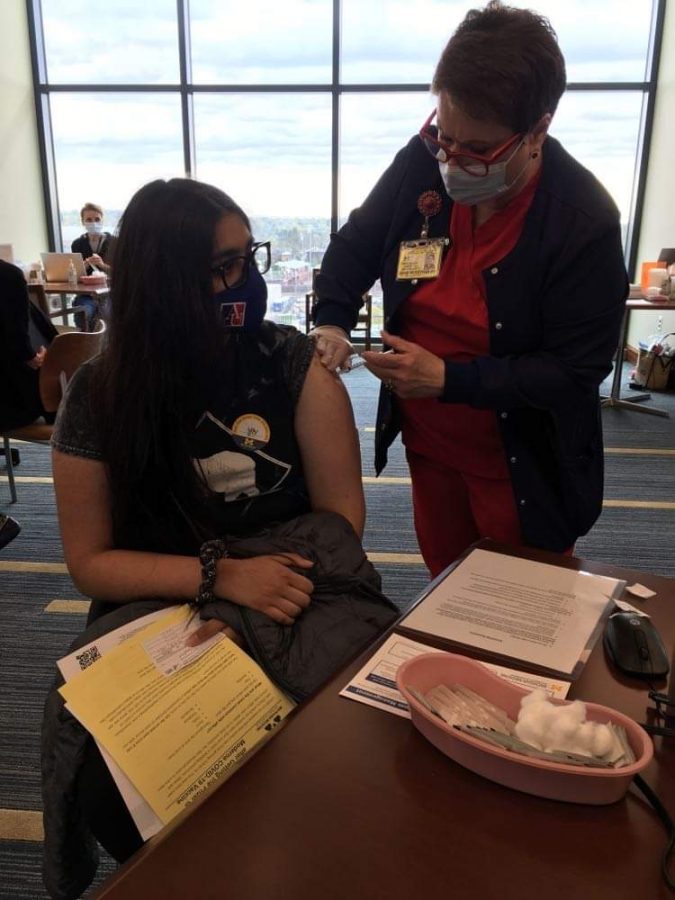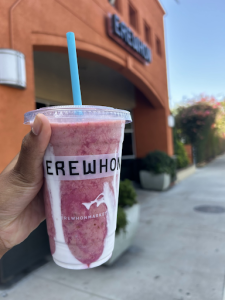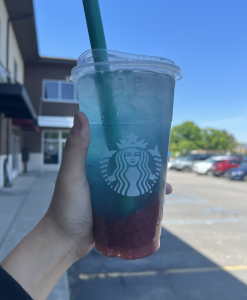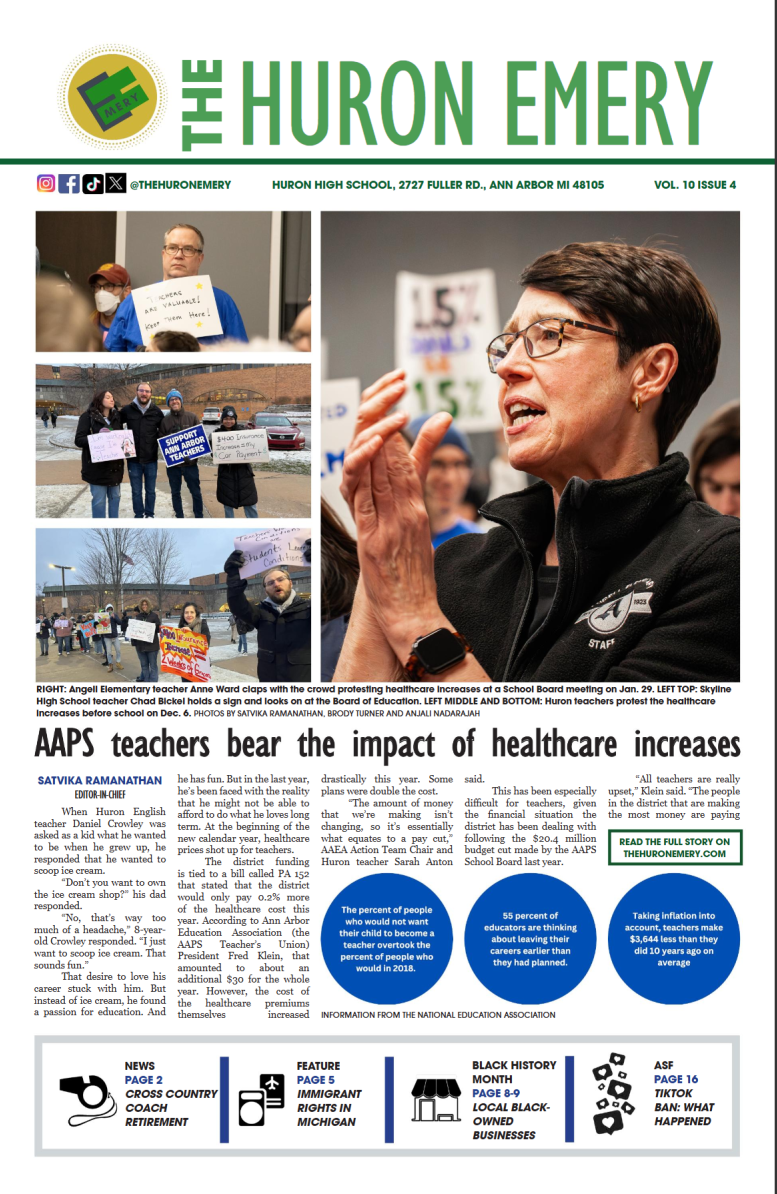The Food and Drug Administration authorizes the Pfizer-BioNTech vaccine for the 12-15 age group
Senior Mishal Charania receiving the first dose of the Pfizer Bio-NTech vaccine at the Univeristy of Michigan stadium. “I am glad we are able ‘to start getting back to normal’ with an increased rate of vaccinations,” Charania said. “But, I think we still need to be cautious.”
May 27, 2021
In order to take prevention measures, the Food and Drug Administration (FDA) authorized the Pfizer-BioNTech COVID-19 vaccine for 12-15 year olds, on May 12.
Following that, a virtual press conference with student journalists was held on May 18, with the Acting FDA commissioner, Janet Woodcock, and the director of FDA’s Center for Biologics Evaluation and Research, Peter Marks to discuss the FDA’s authorization.
“We know this action is a big step for our country, vaccinating a younger population brings us closer to returning to a sense of normalcy into ending the pandemic, something we’ve all been looking forward to,” Dr. Woodcock said in the press conference. “I would like to stress that adolescents, parents and communities can have full confidence in our process of reviewing this vaccine — the FDA has done everything we can to assure that the COVID-19 vaccines we’ve authorized have met our high standards for quality, safety and effectiveness.”
According to Dr. Woodcock, after the FDA decided to take this step, the Center for Disease Control’s (CDC) advisory committee met to discuss the vaccine and “overwhelmingly voted in favor of recommending its use in all teens 12-15 years old.”
After the authorization, more than 600,000 adolescents have received their first dose of the vaccine. Collecting data about clinical trial participants and other vaccinated people, in order to identify any potential safety issues, was part of the authorization.
“This important step the FDA has taken was guided by science,” Dr. Marks explained. “Having a vaccine authorized for a younger population is a critical step in continuing to lessen the immense public health burden caused by the COVID-19 pandemic and helping us all to return to more normal daily life.”
In determining the safety of the Pfizer-BioNTech vaccine, the FDA examined a clinical trial, which consisted of 2,200 people who were between the ages of 12-15 — 1,005 received the Pfizer and 928 received a placebo, made up of saline/saltwater.
This placebo is used to help researchers understand what effect the treatment or new drug has on particular conditions and how the drug actually works. In fact, after most participants received their second dose of the Pfizer vaccine, more than half of them were followed for two months for safety purposes.
“The side effects seen in those ages 12-15, were similar to those experienced by people 16 and older who received the vaccine in earlier clinical trials,” Dr. Marks said. “While some people experience side effects following any vaccination, everyone’s experience isn’t the same and some might not experience any side effects at all.”
19 of the 928 who got the placebo, got COVID-19, which is how the efficiency of the Pfizer-BioNTech vaccine came to be 100 percent.
Now, to evaluate how effective the vaccine is or how well the vaccine worked, the FDA also studied the data of the participants’ immune systems response to the vaccine.
“The agency looked at data from 190 vaccinated 12-15 year olds and compared that information on the immune response of 170 individuals who were 16-25 years old,” Dr. Marks said. “The data added to the clinical trial data that the agency reviewed when authorizing the vaccine and showed that the response was excellent in the 12-15 year old group.”
Through April of this year, 1.7 million children (those between the ages of 11-17) contracted COVID-19. With children younger than 12, doctors have to use a reduced dose(s) of the vaccine and know which one you are going to use, as well as test the children. When some children contracted COVID, they had experienced a rare syndrome — multi-system inflammatory syndrome.
“We don’t know if the vaccine would cause anything like that but we have to make sure that we follow the younger children a bit longer,” Dr. Marks said. “So as much as we like to move down to that population as quickly as possible it took a little longer to get those studies started.”
There is no difference between the Pfizer-BioNTech vaccine being administered or given to 12-15 year olds and those who are 16 and above. Furthermore, there is limited data as to whether the vaccine can prevent transmission from one person to another, and no data of how long the vaccine can protect one from COVID.
“There’s a lot of variability there and we think the response to this vaccine was very robust and the children who received it seem to protect them very well,” Dr. Woodcock said. “But we don’t know for a large variety of people. There are individuals, for example, who may be immunocompromised or have some other condition, who may not react so well.”
As of now, the Ann Arbor Public Schools (AAPS) Board of Education has said, AAPS students will receive a choice between going back to school fully in-person or being virtual for the whole year. There is no word, just yet, of whether schools will be “mask-mandated.”
“There is no hybrid instruction that is a part of our fall planning for 2021,” superintendent Jeanice Swift said in a board meeting. “Hybrid [learning] was a survival plan for the COVID year.”
For more information about the Emergency Use Authorization visit the FDA site and if you want to get vaccinated, visit https://www.vaccines.gov/search/ to get vaccinated.










